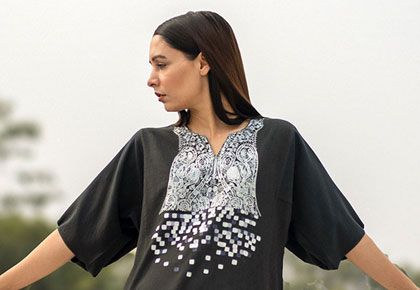'In the process, I hope that our Earth will be able to heal some more.'

Eight years after he started his label, 39-year-old designer Wajahat Raffughar from Kashmir is ready for the spotlight.
A National Institute of Design, Ahmedabad, alumnus, Wajahat been focused on bringing Kashmiri textiles back into the limelight.
"The valley is not only famous for its wonderful climate and natural beauty, but its exquisite textiles and crafts as well," he says.
"If we look up history, Kashmir was situated on one of the many caravan routes in ancient times, that connected to and created the Silk Route."
In an interview with Anita Aikara/Rediff.com, Lakme Fashion Week's GenNext designer talks about the challenges he faced to keep his brand alive, being the first designer in his family and the threat the pandemic holds for the fashion industry.
Why the name Raffughar?
I stumbled upon the name during my final year project at the Craft Development Institute in Srinagar.
I was working with the master soznikaare (artisans) of Kashmir, who told me that their forefathers were rafoogars (darners) who would mend clothes.
It was then that I decided whenever I would have a label of my own, I'd dedicate it to these darners.
Raffughar is dedicated to the famous darners of Kashmir and the label considers the traditional sensibilities of Indian crafts.
Traditional Indian crafts are sophisticated and have refined over the years.
These authentic hand techniques have evolved over a long time and it requires a proper direction to contemporise them.
I enjoy working with the limitations of these crafts and embracing their imperfection and simplicity.
I hope to revive the traditional and natural processes of craft-making in the contemporary global market scenario.
Raffughar rallies forward with 'design, nature and crafts' as a motto, in the hope that we could combine the three to yield a meaningful whole.
Founded in 2013, our journey started with Namda rugs and Pashmina stoles. We later diversified into apparel.
A little background about your family.
My father had a kaleenwaan (carpet workshop) when I was a kid.
Unfortunately, he had to shift to a government job.
My elder brother also has a government job and my younger brother is a writer and journalist.
I am the first person in the family to become a designer.
Why did you then opt for designing?
I studied painting before I went to design school.
While I was studying painting, I felt that the objects I created lacked an immediate function.
In art school, it was more about aesthetics and philosophy.
I wanted to create products, which could serve a human need -- it was partly to do with my innate curiosity and partly because I'm from a multicultural background.
Is it true that youngsters in Kashmir are keen on becoming doctors and engineers rather than weavers, artisans, or designers?
Traditionally, that has been a case in Kashmir, as would be the case elsewhere in India too.
However, with more education and exposure, people are pursuing new fields, taking up different professions and excelling in them.
When did you get the first breakthrough in your career?
It was in 2018 when I did my first pop-up exhibition with Good Earth alongside some eminent names in the industry.
How did the shift happen from designing stoles and rugs to apparels?
I always wanted to make garments. The fact that someone is going to wear your work as second skin is very exciting.
Like most of the labels, I had to wait for a while to set up my studio.
For the shawls and rugs, I could outsource the work and did not need to have my own unit.
It took me a while to set up a unit of my own.

Your experience at NID?
NID made sure that I'm sensitive about things around me.
The aptitude and attitude of a person changes when you can question everything and think afresh about every aspect of design and life.
I feel NID made sure that the students become good humans before becoming designers.
There was always a concern for society and the people we work with.
The institute has nurtured us in a way that we follow ethical and fair-trade practices.
What are the challenges you faced along the way?
Starting a label has never been easy for anyone.
In my case finances were always a major concern while planning and preparing for the launch of Raffughar.
From investments for manufacturing stock to the finances required for the photoshoots and other important things, we needed cash flow for the day-to-day running of the business.
Generating this needed capital initially was one of the biggest challenge I faced.
I had to take up a regular teaching job to keep the label afloat.
What do you consider your biggest achievement to date?
It feels good to know that the label, which was just a dream once, is finally being recognised at a national level.
However, I still feel there is a long way to go. I am looking forward to achieving something bigger.
The brand has achieved a few milestones. This year we are a part of FDCI x Lakme Fashion Week's GenNext batch.
Last year Vogue named us among the five emerging labels of India.
Can sustainable fashion become a mass trend in India?
In the past, fashion was only seen as a glamorous pursuit.
However, now designers are remodeling fashion as not just luxury, but as a solution to many problems.
They are now focusing on affordability, user comfort and sustainability as well.
Due to the pandemic, design houses are facing the huge challenge of sustaining their business amidst loss of revenue and pending bills to run their studios.
As fashion sits at the intersection of art and utility, it has the power and responsibility to create substantial solutions post the pandemic.
That I believe will help to stitch back together communities that are healthier, stronger, and more artistic.
Having said that, it has been seen across society that the pandemic could trigger a reversal of sustainability trends.
How are you preparing for FDCI x Lakme Fashion Week? Is it getting stressful?
It is a mix of excitement, work pressure and anticipation.
We have given our best shot and I hope the audience will enjoy and love our work.

Your FDCI x Lakme Fashion Week collection?
The collection is called Maazi.
It is a recollection of past memories and the nostalgia represented by paisley motifs which are changing.
Post Covid, we're encountering a phygital reality, which is a combination of both physical and virtual platforms.
I have tried to show it through a glitch and metamorphosis of embroidered motifs like melting paisleys, pixelated motifs and those which change into barcodes.
The fabric used is the handwoven and handspun muslin cotton of West Bengal.
The collection has Raffughar's signature pheran silhouettes for summer.
Tulip hem and toor trousers with block printing are also part of this range.
The trends one needs to watch out?
Brands will focus more on factors of sustainability in 2021.
In recent years, many large fashion brands have launched sustainable or conscious lines.
Many have made bold commitments to reduce their carbon footprints, and this year we can expect many more to jump into the sustainability bandwagon.
We are also likely to see several new sustainable brands popping up, and small and independent labels taking up more space than ever.
What does post-Covid fashion look like to you?
This is a wake up call for consumers as well as for the industry.
The threat that this pandemic holds is a call to action for the fashion industry to slow down, move away from mass production, and change direction before an even larger problem is at hand.
We have already seen numerous global store closures, drops in stock prices, cancelled fashion shows, and postponed events.
A huge reshuffling will occur, restarting the entire industry. To stay afloat, brands will need to be savvy and sustainable.
Fashion could return to its basic beauty, an expression of individuality.
In the process, I hope that our Earth will be able to heal some more.
Is there a designer whose work inspires you?
Issey Miyake never fails to inspire me; every season he comes up with something fresh and innovative.
I did notice a striking similarity in our initial approach to work -- he did a contemporary interpretation of the traditional Japanese wear, kimono, and I started with the pheran, the traditional Kashmiri wear.
British-Cypriot-Turkish designer Hussein Chalayan has also been another great inspiration as I relate to the narrative of his work -- he takes inspiration from demographics and anthropology to discover new realms of design.
There's Dutch designer Iris van Herpen, who finds life in non-material things and in exploring the exhaustive possibilities of turning forms of art into fashion.











